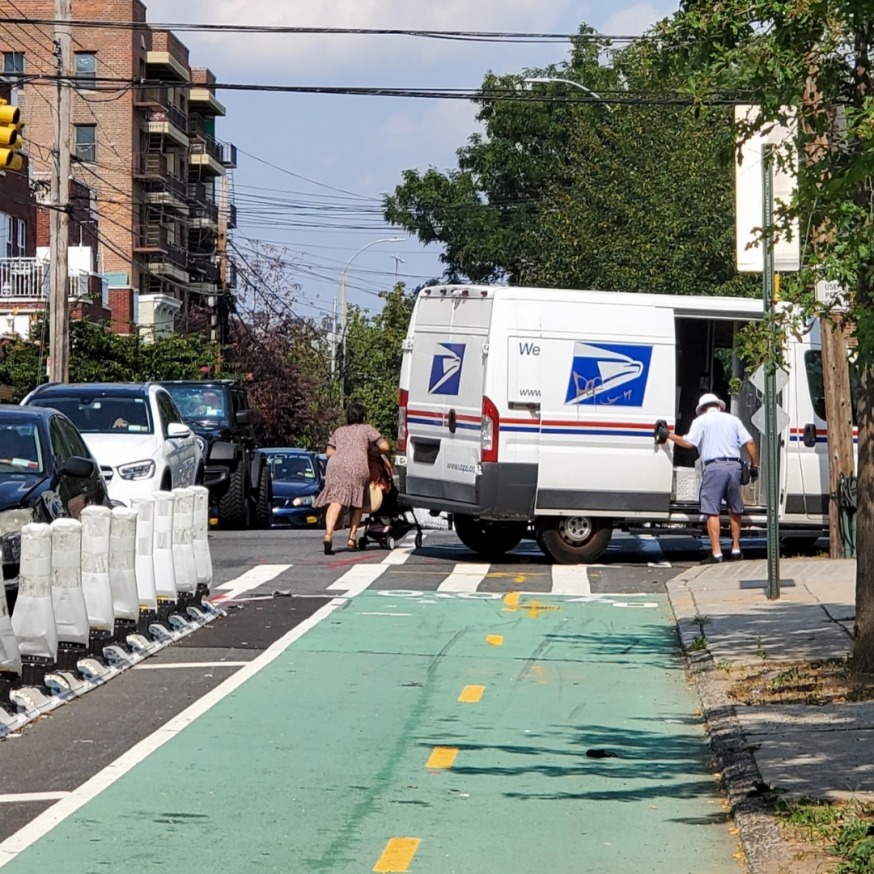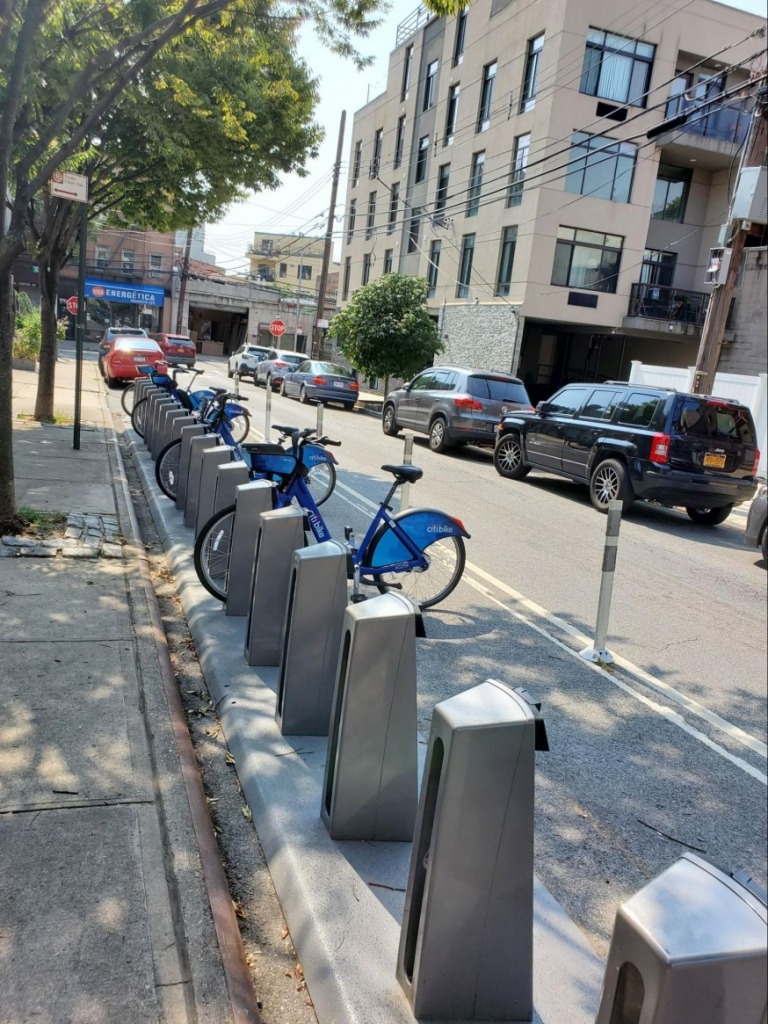
A woman enters traffic with her baby carriage while a USPS van is parked in the bike lane (Photo: Courtesy of Edwin DeJesus)
Sept. 17, 2021 Op-Ed By Edwin DeJesus, candidate for the 22nd District
ASTORIA, NY I am a healthy 24-year-old man who commutes to work on a bicycle, and I love it. I think it’s a great alternative mode of transportation. However, I understand that there is a huge community of people who cannot or prefer not to bike around the city.
I have spoken with many local residents who feel ignored by the rollout of bike lanes and Lyft-owned Citi bike docking stations in northwest Queens. The major rollout of docking stations throughout 2021 has been uncareful and unsafe. It does not align with the interests of our community.
The 2-way bike lane on Crescent Street is dangerous because it runs against oncoming traffic on a busy street near Mt. Sinai hospital. Last Sunday marked 10 months since Alfredo Cabrera Licona was killed by a reckless driver in this bike lane – a collision that could have been avoided with proper bike lane placement.
Protecting bike lanes is necessary; however, the majority of cycling-related accidents occur at intersections. A bike lane going the opposite way never belonged on Crescent Street. There are better side streets for DOT to allocate its resources within Astoria, Woodside, Jackson Heights and East Elmhurst.

Edwin DeJesus is a candidate for the 22nd District of New York City Council (Photo Courtesy of Edwin DeJesus)
Many of us are in favor of making the streets safer. Recently, I was almost hit by a car while I was trying to access Citi bike parking on 29th Street and 24th Avenue, near the Triboro Bridge. Not only is it dangerous to dock a bike in the middle of a street, it is reckless of large corporations like Lyft to normalize not wearing a helmet.
I recently met Aubrey Manfredi, a lifelong Astoria resident who is disabled. She told me the following about living near the Crescent Street lane: “It’s good for bike riders but not for people like me, who are going to the store. It’s very hard. Trucks get stuck in the bike lane because there is no room. Parking space is so limited. Cars are waiting for a spot every morning.”
Manfredi’s family is now paying $225 each month to reserve a private parking spot a few minutes away from her apartment. “It really has affected my health. In the snow, I have to walk to the corner to get into the car. I can’t get into the car in front of my house because of the parking, and it’s painful for me to walk.”
A lack of parking space results in overcrowded streets, which makes it difficult for ambulances to reach hospitals like Mount Sinai, and difficult for delivery vans to serve our families in Astoria. Ultimately, workers are forced to idle in the bike lane, causing further danger and noise pollution.
Circling the block or idling to wait for a parking spot results in higher emissions and defeats the green objective behind the ramping up of bike lanes citywide. Furthermore, our city should have compassion for the many families who lack the financial means to afford a driveway.
Street parking is a necessity during a deadly pandemic, especially for immunocompromised folks who must avoid public transportation. We need to be much smarter and more class conscious in determining the location of bike lanes.
The development of new infrastructure must incorporate common sense. In particular, we can move Citi bike docking away from alternate side parking onto wider sidewalks, and add mini-stations near schools and bus stops.

A Citi bike docking station built on alternate side street parking (Photo: Courtesy of Edwin DeJesus)
If we are going to reimagine the relationship between motorists and cyclists, there must be some compromise involved. For example, instead of creating rush hour congestion with a bike lane on the 59th Street bridge, the city could significantly expand ferry service between Queens and Manhattan for cyclists’ benefit.
This is not a battle between motorists and cyclists. This is a result of corporate greed and corrupt politics which are failing us. We must hold our leadership accountable for systemic issues due to a lack of consideration for the most vulnerable. As a community, we ought to stand in solidarity; we must make it clear to city leaders when new transportation initiatives are hurting New Yorkers.
Unfortunately, both Democrat and Republican politicians care more about re-election and their resume than doing the right thing. A selfish City Council member would boast, “I placed X amount of bike lanes during my tenure” without considering the impact on residential and commercial streets. That is no way for a representative of the people to think and behave.
We must push for a smarter rollout of bike lane placement which preserves street parking, reduces congestion and maintains quality of life for seniors, students, veterans and the disabled. Bike lanes should be approved by the community and only implemented if appropriate safety guidelines are met. Above all, we ought to design a system of decision making that works for everyone in Astoria.
Edwin DeJesus is a candidate for the 22nd District of New York City Council. He is running as an independent Green in the November 2nd general election.





